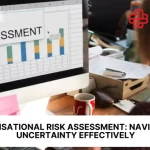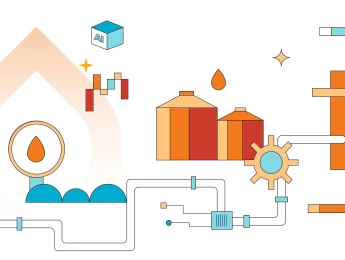The fundamentals of project risk management encompass a systematic approach to identifying, assessing, and mitigating potential threats that could impede project success. At its core, this discipline involves recognising uncertainties that may arise throughout the project lifecycle and implementing proactive measures to address them.
Key steps include identifying risks through thorough analysis, assessing their impact and likelihood, prioritising them based on severity, and developing risk response strategies to either avoid, mitigate, transfer, or accept the risks. Effective project risk management minimises the chances of negative events occurring and enhances opportunities for achieving project objectives.
As projects evolve, they require clear communication, stakeholder collaboration, and continuous monitoring and reassessment. By integrating risk management into project planning and execution, organisations can confidently navigate uncertainties, ultimately increasing the likelihood of project success.
Upon completion of this course, participants will be able to:
- Understand the essence of project definition and its components.
- Identify critical activities essential for project success.
- Comprehensively understand the entire project lifecycle.
- Recognise and value key stakeholders in project dynamics.
- Master the creation of comprehensive project planning documents.
- Establish and manage project timelines effectively.
- Acquire skills in proficient project quality management.
- Explore the sequential stages within project management.
- Organise and optimise human resources for project execution.
- Craft a project charter and define the project scope.
- Plan projects with both fixed and variable timeframes.
- Determine resource allocation and associated costs.
- Utilise project management software for basic project management tasks.
This course is designed for anyone responsible for project risk management within an organisation. It would be most beneficial for:
- Project Managers
- Risk Assessors
- IT Specialists
- IT Managers
- Operations Managers
- Data Analysts
- Finance Managers
- Health & Safety Assessors
This course uses a variety of adult learning styles to aid full understanding and comprehension. Participants will view a trainer-led presentation to understand the best ways to create a valuable RACI chart and include all stakeholders in project management planning.
They will work together on a communication strategy and discuss potential risks for each type of project based on the physical and technological developments required. As a group discussion, they will discuss solutions and workable mitigation techniques that could be used to overcome the problem and understand how these elements could be put in place.
Day 5 of each course is reserved for a Q&A session, which may occur off-site. For 10-day courses, this also applies to day 10
Section 1: The Foundations of Project Management & Managing Risks
- Understanding the basics of project management.
- Introduction to risk management in projects.
- Identifying and assessing project risks.
- Strategies for mitigating project risks.
- Integrating risk management into project planning.
- Monitoring and controlling project risks.
- Case studies on successful risk management in projects.
Section 2: Planning a Breakdown of Activities for Risk Assessment
- Breaking down activities for risk assessment planning.
- Identifying potential risks within activity breakdowns.
- Assessing risks associated with individual project tasks.
- Strategies for prioritising and managing activity-based risks.
- Integrating risk assessment into activity planning.
- Tools and techniques for effective risk analysis at the activity level.
- Case studies on activity-based risk planning.
Section 3: Scheduling & Budget Allocation
- Fundamentals of project scheduling.
- Techniques for effective budget allocation.
- Developing project schedules aligned with objectives.
- Optimising resource utilisation within budget constraints.
- Tools and software for project scheduling and budgeting.
- Monitoring and controlling project schedules and budgets.
Section 4: Risk Register Formulation & RACI Chart for Responsible Parties
- Creating a comprehensive risk register.
- Identifying and documenting project risks.
- Assigning responsibilities using RACI charts.
- Defining roles for risk management.
- Integrating risk register and RACI chart for accountability.
- Utilising risk register and RACI chart in project planning.
Section 5: Risk Prevention & Mitigation Techniques
- Understanding risk prevention strategies.
- Implementing proactive risk mitigation techniques.
- Identifying early warning signs of potential risks.
- Developing contingency plans for risk mitigation.
- Utilising risk avoidance methods when possible.
- Integrating risk management into project planning processes.
Section 6: Software Training for Project Risk Management
- Introduction to project risk management software.
- Navigating risk management software interfaces.
- Data entry and risk identification in software tools.
- Analysing and prioritising risks using software features.
- Generating reports and visualisations from risk management software.
- Integrating risk management software with project planning tools.
- Hands-on exercises and case studies using project risk management software.
Upon successful completion of this training course, delegates will be awarded a Holistique Training Certificate of Completion. For those who attend and complete the online training course, a Holistique Training e-Certificate will be provided.
Holistique Training Certificates are accredited by the British Assessment Council (BAC) and The CPD Certification Service (CPD), and are certified under ISO 9001, ISO 21001, and ISO 29993 standards.
CPD credits for this course are granted by our Certificates and will be reflected on the Holistique Training Certificate of Completion. In accordance with the standards of The CPD Certification Service, one CPD credit is awarded per hour of course attendance. A maximum of 50 CPD credits can be claimed for any single course we currently offer.
- Course Code PO4-123
- Course Format Classroom, Online,
- Duration 5 days














